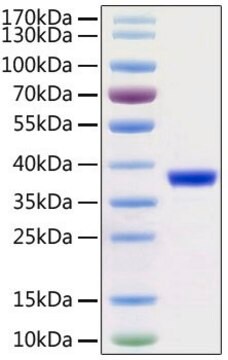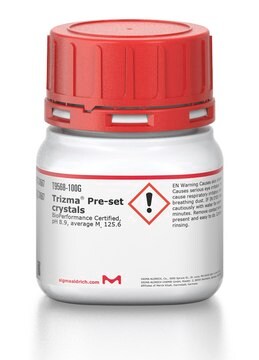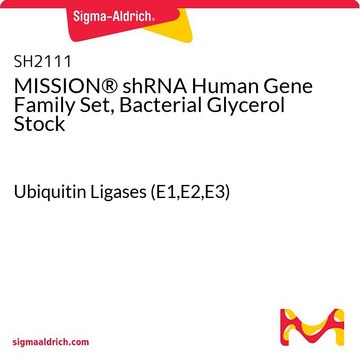Alle Fotos(1)
Wichtige Dokumente
SH1931
MISSION® shRNA Human Gene Family Set, Lentiviral Particles
Apoptosis Pathway
Anmeldenzur Ansicht organisationsspezifischer und vertraglich vereinbarter Preise
Alle Fotos(1)
About This Item
UNSPSC-Code:
41106609
NACRES:
NA.51
Empfohlene Produkte
Suchen Sie nach ähnlichen Produkten? Aufrufen Leitfaden zum Produktvergleich
Allgemeine Beschreibung
Lentiviral particles (representational, plate titer) are provided in 96-well plates that are barcoded for simple identification. Aliquots of 4 x 50μl are provided to prevent the need for excessive freeze/thaw, and maximize functional viral particles. Each gene family set is representationally titered (10% of clones). Fully titered sets are also available, for more information inquire at RNAi@sial.com. A CD containing RefSeq, gene description, gene symbol, clone ID, hairpin sequence, locus link, and plate map positions are provided with the gene family set.
Sonstige Hinweise
Each MISSION shRNA clone is constructed within the lentivirus plasmid vector, pLKO.1-Puro, followed by transformation into Escherichia coli. The pLKO.1-Puro vector contains bacterial (ampicillin) and mammalian (puromycin) antibiotic resistance genes for selection of inserts in either bacterial or mammalian cell lines. Each clone set consists of an average of 3-5 constructs that have been designed against each target gene using a proprietary algorithm. Therefore, a range of knockdown efficiency, with at least one construct from each gene set being >70%, can be expected when using these clones. This allows one to examine the effect of loss of gene function over a large series of gene knockdown efficiencies. Each shRNA construct has been cloned and sequence verified to ensure a match to the target gene.
For a detailed listing of other available gene family sets, visit the gene family set website.
Number of Genes: 443, Number of Clones: 3512
The exact gene and clone count at time of purchase may vary slightly as the TRC library is continually updated.
Rechtliche Hinweise
Use of this product is subject to one or more license agreements. For details, please see http://sigmaaldrich.com/missionlicense .
MISSION is a registered trademark of Merck KGaA, Darmstadt, Germany
Lagerklassenschlüssel
12 - Non Combustible Liquids
WGK
WGK 3
Flammpunkt (°F)
Not applicable
Flammpunkt (°C)
Not applicable
Persönliche Schutzausrüstung
Eyeshields, Gloves, multi-purpose combination respirator cartridge (US)
Analysenzertifikate (COA)
Suchen Sie nach Analysenzertifikate (COA), indem Sie die Lot-/Chargennummer des Produkts eingeben. Lot- und Chargennummern sind auf dem Produktetikett hinter den Wörtern ‘Lot’ oder ‘Batch’ (Lot oder Charge) zu finden.
Besitzen Sie dieses Produkt bereits?
In der Dokumentenbibliothek finden Sie die Dokumentation zu den Produkten, die Sie kürzlich erworben haben.
Role of apoptosis in the pathogenesis of COPD and pulmonary emphysema
Demedts, I. K., et al.
Respirology, 7, 53-53 (2006)
Apoptosis, pyroptosis, and necrosis: mechanistic description of dead and dying eukaryotic cells.
Susan L Fink et al.
Infection and immunity, 73(4), 1907-1916 (2005-03-24)
Susan E Logue et al.
Biochemical Society transactions, 36(Pt 1), 1-9 (2008-01-23)
Apoptosis, a highly controlled mode of cell death, is utilized to eliminate superfluous, aged, injured or infected cells from the body. Caspases, a family of aspartic acid-specific proteases, are the major effectors of apoptosis. To curtail their activity, caspases are
Dmitri V Krysko et al.
Methods (San Diego, Calif.), 44(3), 205-221 (2008-03-04)
Three major morphologies of cell death have been described: apoptosis (type I), cell death associated with autophagy (type II) and necrosis (type III). Apoptosis and cell death associated with autophagy can be distinguished by certain biochemical events. However, necrosis is
J C Burns et al.
Proceedings of the National Academy of Sciences of the United States of America, 90(17), 8033-8037 (1993-09-01)
The restricted host-cell range and low titer of retroviral vectors limit their use for stable gene transfer in eukaryotic cells. To overcome these limitations, we have produced murine leukemia virus-derived vectors in which the retroviral envelope glycoprotein has been completely
Unser Team von Wissenschaftlern verfügt über Erfahrung in allen Forschungsbereichen einschließlich Life Science, Materialwissenschaften, chemischer Synthese, Chromatographie, Analytik und vielen mehr..
Setzen Sie sich mit dem technischen Dienst in Verbindung.






